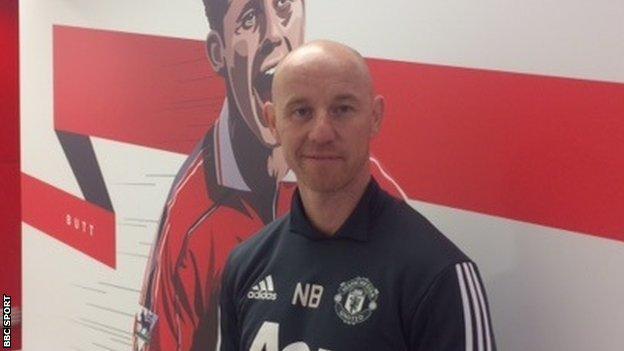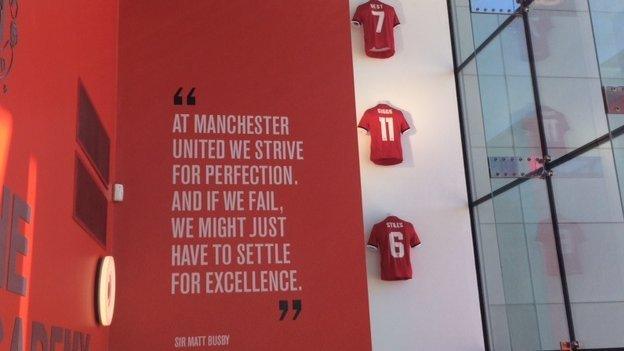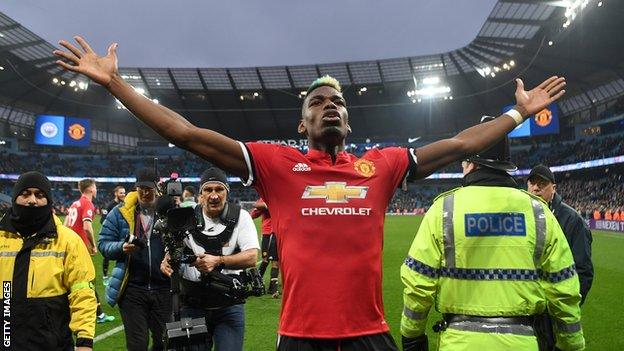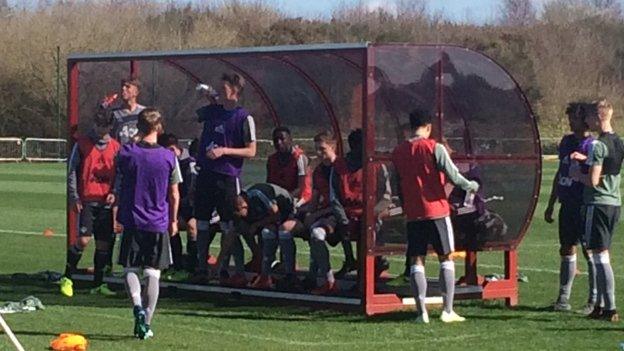Manchester United: Nicky Butt defends academy after under-23s' relegation
- Published

Nicky Butt stands by the image of himself on a mural at Manchester United's academy
One of Manchester United's proudest boasts is that at least one homegrown player has been in every first-team squad named since 1937.
For the dramatic Manchester derby comeback on 7 April, there were five. Manchester City - crowned runaway Premier League champions a week later - had none.
And with United's under-18s beating rivals City, external to win their regional league title on Saturday, the thriving youth set-up, which originated in the famous Busby Babes era, would seem to be in rude health.
But not everything is rosy. On Monday the under-23 side were demoted from Premier League 2 and there is a slight sense of embarrassment from some at Old Trafford.
However, academy boss Nicky Butt, who was part of United's fabled Class of 92, says the club's youth system is in good shape.
And the 43-year-old has never made any secret of the fact that he is not a fan of the under-23s concept.
"If you are not around the first team at 20 or 21 you're not going to be, it's a fact," he said.
'I think the academy is thriving massively'

George Best (shirt number seven) and Ryan Giggs (11) both came through Manchester United's youth system
The former England midfielder is one of a number of famous United players depicted on the ground-floor walls of the club's academy at Carrington in south Manchester.
Butt says some are "dinosaurs" like himself, but others are contemporary, including 20-year-old England forward Marcus Rashford.
The mural stands as evidence of the pathway that exists between United's academy and the first team.
The under-23s, however, are effectively what used to be the club's reserve team, and Butt does not see it as playing a significant role in his primary task, which is providing young players for first-team manager Jose Mourinho.
"We are expected to develop players for Manchester United and bring them into the first team. In that respect, I think the academy is thriving massively," says Butt, who was 17 in 1992 when he made the first of his 387 appearances for United.
Butt says that "the key development tools here are the academy and under-18s", because much of the under-23s set-up is fractured by other factors.
He estimates that at any given time in a 20-man under-23s squad, five players may be training with the first team, another five will be out on loan and the remaining 10 will be bolstered by teenagers who have outgrown the under-18s.
"That is fine if everyone else is doing it," says Butt. But the truth is they are not. For some clubs, success at under-23 level is about winning games, not necessarily developing players.
It is certainly a major change from when Butt was breaking through in the early 1990s, when he recalls playing in reserve games alongside the likes of first-team regulars such as Bryan Robson, Brian McClair and Clayton Blackmore.
"It was open-age football in a stadium with 5,000 people watching," says Butt.
"Flick that over to now: sometimes we go and play at a training pitch on a Tuesday afternoon with no fans and no first-team players."
The two most recent United youngsters to break into the first team are Rashford, who started just two reserve games for the club, and 21-year-old Scott McTominay, who started 31.
The truth is that some of the under-23 team know they are not going to make it at United. They are in the shop window, looking to find a club elsewhere.
Pogba 'might not have made it' if he had stayed

Paul Pogba left Old Trafford in 2012 to join Juventus, returning in 2016 for £89m
There are about 180 youngsters in the United academy, from under-nines through to the reserve team.
The aim, club officials state, is to have a core of local youngsters supplemented by promising overseas talent.
In terms of local youngsters, Birkenhead teenager Jimmy Garner has impressed as England Under-17s captain. Current first-team star Paul Pogba, of course, belongs firmly in the latter category.
The 25-year-old Frenchman moved to Old Trafford from Le Havre at the age of 16, played in the 2011 FA Youth Cup final, made his senior debut a few months later and made his Premier League bow against Stoke on 31 January, 2012. Big things were expected.
But within six months Pogba had joined Juventus after refusing to sign a new contract, citing a lack of opportunities.
It cost United a then-world record £89m to get him back in 2016. The move was widely viewed as confirmation of a monumental error by United in allowing Pogba to leave for nothing when his contract expired.
Butt, however, does not see the situation in such clear-cut terms.
"If he had stayed here and stagnated, he might never have been a footballer," he says.
"There are players who go into the reserves for two or three seasons and they tread water. Pogba could have been one of those.
"When he was here, so were Paul Scholes and Michael Carrick, who weren't exactly average players. Pogba left and became probably the best midfielder in the world at Juventus.
"We were lucky enough to get him back here but it is a massive feather in our cap that we helped him develop."
'No more number 10s!'

Youngsters at Manchester United have a long list of famous homegrown players to emulate
The old north and south reserve leagues were scrapped in 1999 and replaced by the Premier Reserve League.
In 2012 that was replaced by an under-21s league, from which the under-23s set-up evolved in 2016. It allows clubs to play three over-age outfield players.
According to Butt, however, it is not just the league system that has changed but the players. In particular, he has noted a huge reduction in the number of industrious midfielders and a spike in Lionel Messi-style number 10s.
Pointing to a group of under-12s, Butt says: "If you ask them, they will all want to be Messi.
"People should not forget how good Roy Keane and Steven Gerrard were, these box-to-box players that aren't the traditional modern academy. That is what we have to get out of.
Butt also said that he is trying to "pull kids out of their comfort zone. Playing against South American teams who won't let you take touches".
"Our under-12s will play the same kids at City, Spurs or Arsenal for the next eight years. They will end up as mates, play for England together. It's false," he added.
And United are not alone in their problems at under-23 level.
Two other clubs that Butt rates as good at developing players have also struggled recently: Southampton, relegated from Premier League 2 last season, and Tottenham, who survived on goal difference last term but struggled in the wrong half of the table.
Butt cannot change the structure of youth football on his own, so he will carry on his own path, knowing he has the backing of those responsible for running the club, irrespective of who the manager is.
"It doesn't matter whether the manager is David Moyes, Louis van Gaal or Jose Mourinho, the owners have told us the academy is ring-fenced," he explains.
"Our foundations, our pillars, stay solid and stand on their own."